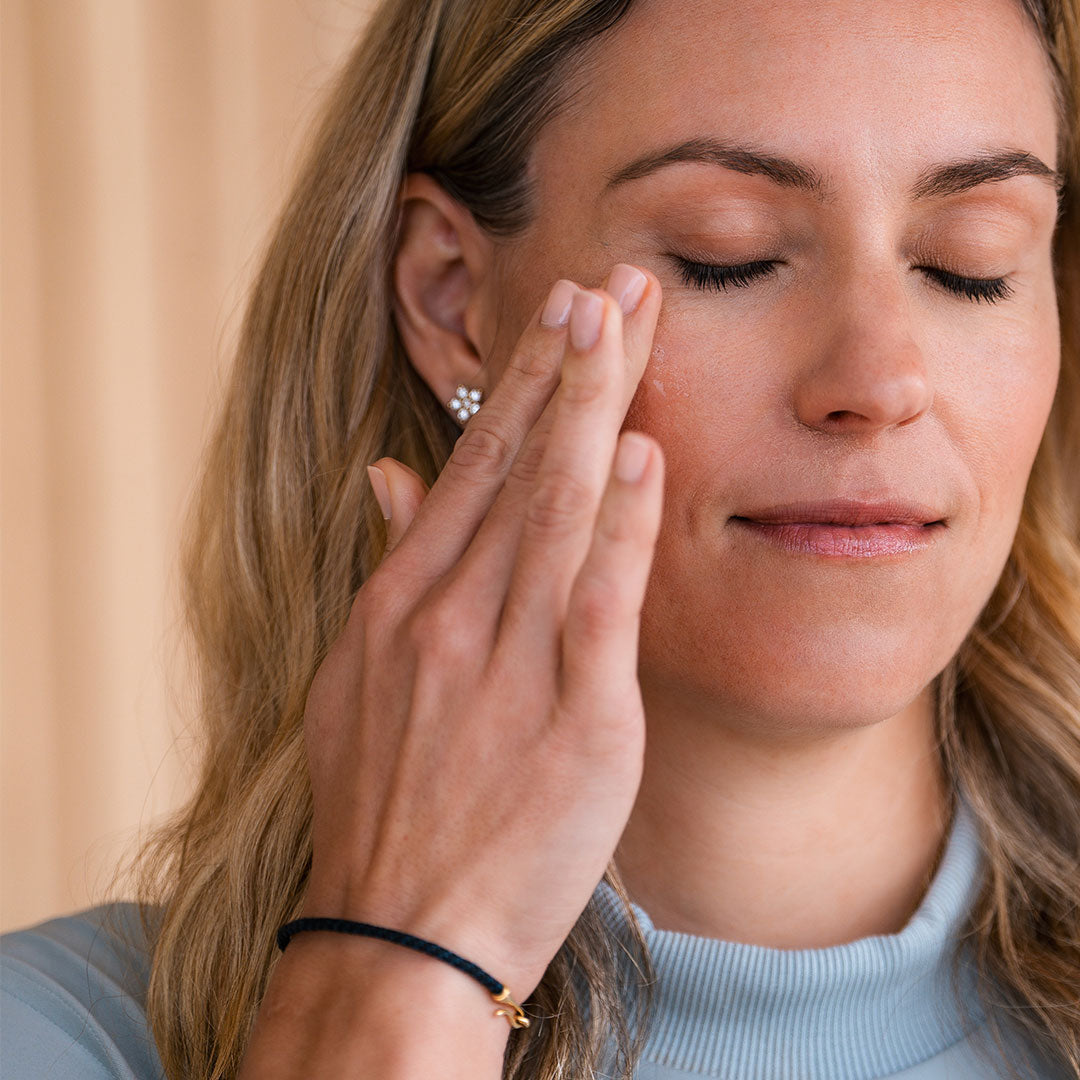
Antioxidants & free radicals in skin care
The skin is not only our largest organ, but also a protective layer that shields our inner workings from external influences and pollutants. But what actually protects the skin from these irritants? The answer seems simple: antioxidants. But what exactly does this term mean? And what do antioxidants have to do with free radicals?
In this article, we'll explore these questions together and show you which antioxidants we use in newkee skin care – and what they can specifically do for your skin.
Everything about antioxidants and free radicals at a glance:
– Antioxidants are molecules that protect the organism from oxidative stress by neutralizing free radicals.
– Free radicals, on the other hand, are molecules that are missing an electron , which they “steal” from other cells.
– The chemical reaction in which the electron is removed is called oxidation and can damage affected cells .
– The higher the concentration of free radicals, the higher the oxidative stress.
– Oxidative stress causes the skin to age faster and promotes the development of diseases.
– Antioxidants can prevent oxidation by neutralizing free radicals and thus effectively counteract skin aging.
– We absorb antioxidant substances primarily through food, but they can also be supplied to the skin through care products.
– The best protection against oxidative stress is to avoid UV damage (through sunscreen), nicotine, alcohol, stress and an unhealthy diet , as these lead to increased formation of free radicals.
Antioxidants and free radicals – what are they actually?
Skincare often revolves around terms like antioxidants and free radicals. But what exactly do these terms mean and why are they so important?
How exactly do antioxidants work in the body?
Some antioxidants take the direct route and react chemically with free radicals , donating electrons . This chemical reaction neutralizes the free radicals , preventing them from damaging other cells.
Other antioxidants work more subtly. They act indirectly, for example, by strengthening cell membranes , which helps cells protect themselves against external attacks. Some of these protective substances also influence metabolism within cells , thus supporting the cell's natural defense mechanisms against oxidative damage.
Interestingly, there are also antioxidants that interact with each other. This phenomenon is called an "antioxidant network." One example of this collaboration is the interaction between vitamin C and vitamin E. While vitamin C has the ability to regenerate depleted vitamin E, both vitamins work together as an antioxidant force in the skin. Minerals such as selenium and zinc complement this system, helping to form a strong and efficient network to protect the skin.
Antioxidants therefore ensure that our skin is protected from the harmful effects of free radicals, either through direct neutralization or by strengthening cell structures and functions.
Are free radicals really that harmful to the skin?
Our bodies have an impressive, well-functioning defense system to keep free radicals at bay. This system constantly works in the background to ensure that these potentially harmful molecules don't overwhelm our cells.
However, when there is an overproduction of free radicals, a condition known as oxidative stress occurs. This stress leads to cell and tissue damage that the body cannot easily repair. The effects of oxidative stress can be far-reaching: It causes the skin to age faster and can even increase the risk of certain diseases.
When oxidative stress persists over a long period of time, it impairs the skin's natural ability to regenerate . The result? An accelerated aging process and the appearance of wrinkles . Therefore, free radicals are often cited as the main cause of skin aging .
Some free oxygen radicals can cause lasting damage to membranes, DNA, lipids and proteins, as well as collagen, which is so important for the skin, attacking the structure of the skin cells and thus leading to the formation of wrinkles.
In short: free radicals definitely leave visible traces on the skin . This makes it all the more important to optimally support the skin's defenses.
These antioxidants are used in skin care
As long as we're young, our bodies are able to produce sufficient amounts of antioxidants, such as coenzyme Q10. However, this production decreases as we age, increasing the risk of oxidative stress. As a result, free radicals, which can damage the skin, find fewer antioxidants to counteract them. The result is accelerated collagen breakdown and a diminished ability of the skin to regenerate .
Skin care products enriched with antioxidants can give your skin additional protection against the effects of free radicals. In Germany, the antioxidants permitted in cosmetic products are regulated by Regulation (EC) No. 1333/2008 and the Cosmetics Regulation . The most prominent antioxidants used in skin care products include:
Vitamin A (Retinol):
A natural antioxidant for the skin. Studies show that its topical application can improve skin's appearance and reduce fine to medium-depth wrinkles, skin roughness, pigmentation, and loss of elasticity.
Vitamin C (Ascorbic Acid):
Also known as L-ascorbic acid, this water-soluble antioxidant is found primarily in fruits and teas. It acts as a cofactor in collagen synthesis and can significantly improve skin texture, the appearance of fine lines, and skin elasticity.
Vitamin E (tocopherol):
Vitamin E is often used in cosmetics in the form of tocopherol, tocotrienol, or vitamin E acetate. It can prevent redness (erythema) and inflammatory skin damage caused by UV rays.
Niacinamide (Vitamin B3):
This antioxidant can reduce fine lines and wrinkles, alleviate hyperpigmentation and redness, and increase skin elasticity. It also promotes the synthesis of ceramides (skin-derived lipids), which decrease with age and are important for maintaining an intact skin barrier.
Dexpanthenol:
Derived from vitamin B5 (as a precursor) it can suppress the formation of free oxygen radicals and hydrate the skin, especially in cases of dryness.
L-Carnosine:
L-Carnosine is a dipeptide that occurs naturally in our bodies. It protects cells from oxidative stress and inhibits glycation (the formation of sugars) in cells.
Squalane:
Squalane also occurs naturally in the body and makes up 15% of sebum. As an active ingredient, it not only protects your skin from moisture loss but also prevents the oxidation of your skin's own oils.
Bioflavonoids:
Also known as flavonoids, these are secondary plant substances that act as growth regulators and pigments in plants. Bioflavonoids also protect the skin from UV radiation, neutralize free radicals, and help skin cells absorb vitamin C—thus protecting collagen production.
You can find these antioxidants in newkee skincare
Our skin is exposed to a variety of stressors every day—environmental factors, stress, and, last but not least, natural aging. Our response to these challenges is skincare products enriched with selected antioxidants that not only protect your skin but also provide intensive care. Therefore, we rely on the following antioxidant-effective ingredients in our skincare:

– Face serum : Our new serum is enriched with the vitamin B3 derivative niacinamide. It reduces wrinkles, minimizes redness, and, with regular use, can noticeably lighten dark spots.
– face cream day SPF 15 : As a day cream, it not only offers you protection against UV rays, but also contains nourishing squalane, regenerating L-carnosine, vitamin E (tocopherol) and protective bioflavonoids.
– face cream night : This cream regenerates your skin overnight with squalane, vitamin E and bioflavonoids.
– Face Sunscreen 50+ : Protects your facial skin from UV damage and oxidative stress with a high SPF of 50+. It's also enriched with nourishing vitamin E and L-carnosine to counteract the formation of wrinkles.
– daily sunscreen 50+ : Our sunscreen also protects your body with SPF 50+ and at the same time nourishes your skin with antioxidant L-carnosine.
– lip balm SPF 30 : Our lip balm keeps your lips supple, protects them from the sun and offers additional antioxidant protection with vitamin E.
– body lotion soft & body lotion intensive : Our gentle and intensive body care contains vitamin E as well as the antioxidant vitamin C derivative ascorbyl palmitate and the synthetic antioxidant hydroxyacetophenone.
– hand cream: Our hand cream pampers your hands with nourishing squalane and antioxidant hydroxyacetophenone.
– body wash & shampoo : Our mild cleansing for body, hair and scalp is rounded off with the protective effect of vitamin E and ascorbyl palmitate (vitamin C derivative).
– conditioner : The newkee conditioner makes your hair silky soft and also supplies your scalp with antioxidant vitamin E.
We've carefully formulated our skincare products to provide you with not only regenerative care but also additional protection against free radicals. Especially in facial care, the combination of sunscreen and antioxidant active ingredients allows you to achieve the best for your skin – and provide lasting protection against premature aging and skin damage .
Conclusion
Antioxidants are the unsung heroes when it comes to protecting and caring for our skin. They neutralize free radicals, which contribute significantly to premature skin aging and the formation of wrinkles, and strengthen our skin cells.
To prevent oxidative stress, you should first protect your skin from external influences that lead to increased formation of free radicals. Sunscreen is most important here, as UV rays in particular not only lead to more free radicals in the skin but can also severely damage the affected skin cells. You should also avoid nicotine and alcohol, ideally.
Skincare products enriched with antioxidants are the perfect complement to sun protection and give your skin additional support every day by neutralizing radicals already present in your skin.
Intensive care
with antioxidants:
Images: @fleuraimeekaan, @one.haus, @timmossholder
































